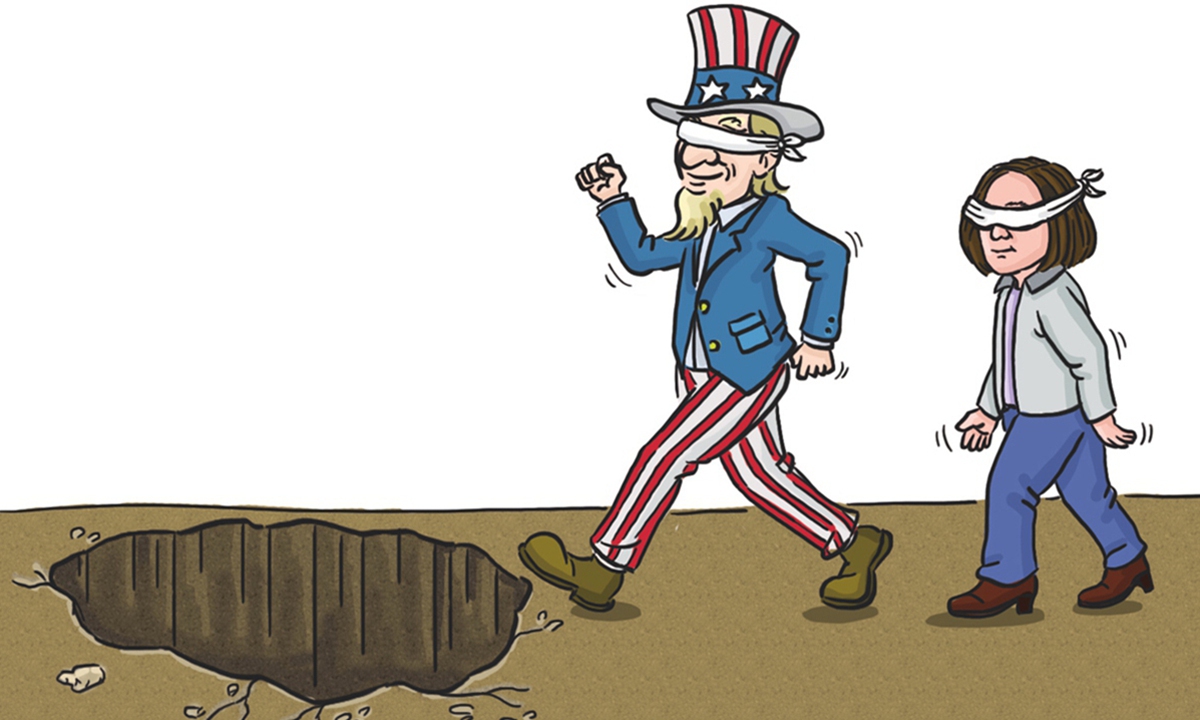US, Taiwan Illustration: Xia Qing/GT
Hou Yu-ih, the Kuomintang presidential nominee in the Taiwan regional leadership election, said he accepted a version of the consensus that conformed to the "Constitution" of the island of Taiwan, according to reports from local media.
In contrast to the Democratic Progressive Party (DPP) stance, Hou said he was against the interpretation of the consensus as "one country, two systems," and was even more strongly opposed to the current Taiwan regional leader Tsai Ing-wen's "stigmatization" of the consensus.
Hou did not elaborate on the remarks, but he echoed the KMT's long-held position of "one China, different interpretations," which despite recognizing that there is only one China, gives tacit freedom to Taipei and Beijing to come to separate conclusions as to what "China" means.
The "1992 Consensus" was reached through separate authorized negotiations between the Association for Relations across the Taiwan Straits (ARATS) and the Straits Exchange Foundation (SEF) in 1992.
The core implication of the "1992 Consensus" is that both sides of the Taiwan Straits belong to the same China. It clearly defines the fundamental nature of cross-Straits relations and serves as the political foundation for the peaceful development of relations between the two sides, and it is also considered the "anchor of stability" for maintaining peace and stability in the Straits.
From 2008 to 2016, both sides of the Taiwan Straits established mutual trust based on the "1992 Consensus" and jointly created a situation of peaceful development in cross-Straits relations, which has brought tangible benefits to compatriots on both sides, Chen noted.
In 2011, the trade volume across the Straits reached $160.03 billion, and by 2021, it had increased to $328.34 billion, doubling in the span of ten years. As of 2011, there were a cumulative total of 85,772 investment projects by Taiwanese businesses in the Chinese mainland. By the end of 2021, the cumulative total of investment projects by Taiwanese businesses in mainland had reached 124,142, marking a rise of 44.7 percent over the course of 10 years.
However, the cross-Straits cooperation in these fields has been disrupted due to the DPP authorities' refusal to accept the 1992 Consensus and their pursuit of a secessionist agenda with the support of foreign forces.
The DPP authorities, driven by their selfish separatist agenda, have shown no hesitancy in betraying Taiwan businesses' interests and selling out Taiwan's semiconductor industry. By offering TSMC to Europe on a plate, the DPP hopes to gain tips from European countries by "strengthening relations" with them. However, if Taiwan's semiconductor sector is hollowed out, there is no doubt that the Taiwan economy will suffer a severe blow.
Taiwan's economy saw a year-over-year contraction of 3.02 percent in the first quarter of 2023 amid falling global demand for exports from the island. The island's first-quarter exports dropped 19.2 percent from a year earlier in US dollar terms. Amid its recession, Taiwan has revised down its 2023 economic growth forecast as weak exports continue to drag on the economy.
Li Fei, a professor at the Taiwan Research Center at Xiamen University, told the Global Times previously that currently the biggest obstacle for cross-Straits exchanges and cooperation is that the DPP has abandoned the political foundation for cross-Straits peaceful exchange - the 1992 Consensus.
This means the mainland is unable to retain official-level exchanges and communication with the island, and people-to-people exchanges are also greatly reduced due to the interruption.
Global Times

